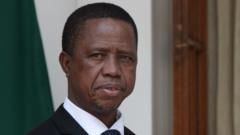Abdullah Ahmad Badawi, who served as Malaysia's fifth Prime Minister from 2003 to 2009 and was praised for extending political freedoms, passed away at the age of 85 after battling health issues.
Abdullah Ahmad Badawi: Malaysia's Quiet Leader Passes Away at 85

Abdullah Ahmad Badawi: Malaysia's Quiet Leader Passes Away at 85
The former Prime Minister of Malaysia, known for his moderate governance, has died in Kuala Lumpur.
Abdullah Ahmad Badawi, a distinguished figure in Malaysian politics and the country's fifth prime minister, passed away in Kuala Lumpur on Monday at the age of 85. Having held office from 2003 to 2009, Abdullah was noted for fostering political freedoms and advocating for a moderate interpretation of Islam in his largely Muslim nation. His son-in-law, Khairy Jamaluddin, revealed that Abdullah succumbed to complications related to longstanding "breathing issues" and had previously been diagnosed with dementia.
Abdullah's leadership characterized a significant shift from the robust control exercised by his predecessor, Mahathir Mohamad. This shift contributed to a more open political landscape, allowing for critical discussions about Malaysia's complex sociopolitical fabric, which includes the interactions between moderate and hard-line Islamic viewpoints along with the interests of the Chinese and Indian minorities. Bridget Welsh, an expert on Malaysian politics at the University of Nottingham, remarked that Abdullah's commitment to dialogue was a notable strength of his administration, promoting a climate conducive to political discourse.
However, Abdullah's calm demeanor often received mixed reviews; he was occasionally criticized for lacking the vigor expected in a prime minister, earning him the unflattering nickname "the sleeping prime minister" due to instances of drowsiness in public appearances. Despite the challenges that marked his tenure, his administration began with considerable electoral success, marking a significant moment in Malaysia's political evolution.
Abdullah's leadership characterized a significant shift from the robust control exercised by his predecessor, Mahathir Mohamad. This shift contributed to a more open political landscape, allowing for critical discussions about Malaysia's complex sociopolitical fabric, which includes the interactions between moderate and hard-line Islamic viewpoints along with the interests of the Chinese and Indian minorities. Bridget Welsh, an expert on Malaysian politics at the University of Nottingham, remarked that Abdullah's commitment to dialogue was a notable strength of his administration, promoting a climate conducive to political discourse.
However, Abdullah's calm demeanor often received mixed reviews; he was occasionally criticized for lacking the vigor expected in a prime minister, earning him the unflattering nickname "the sleeping prime minister" due to instances of drowsiness in public appearances. Despite the challenges that marked his tenure, his administration began with considerable electoral success, marking a significant moment in Malaysia's political evolution.





















